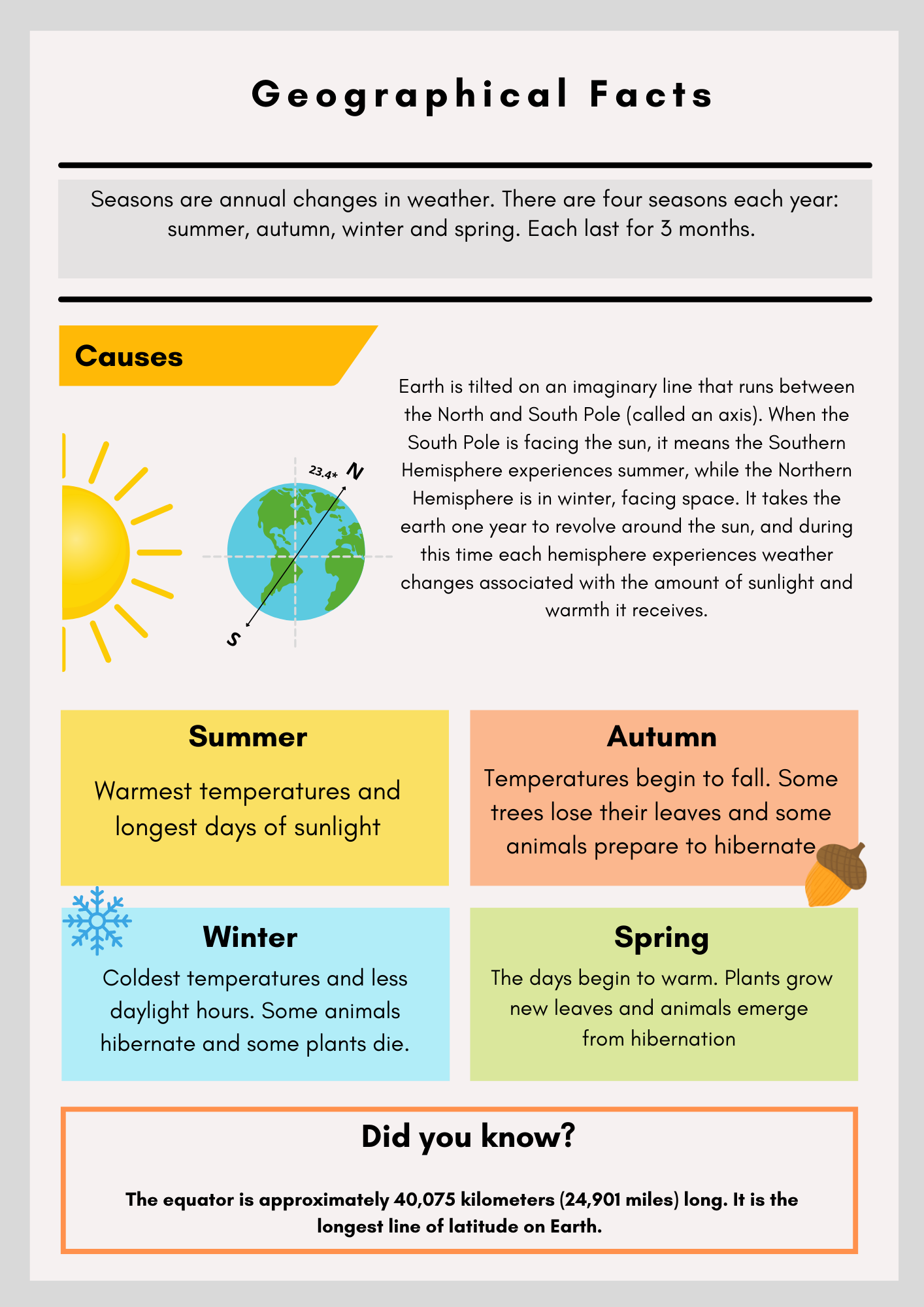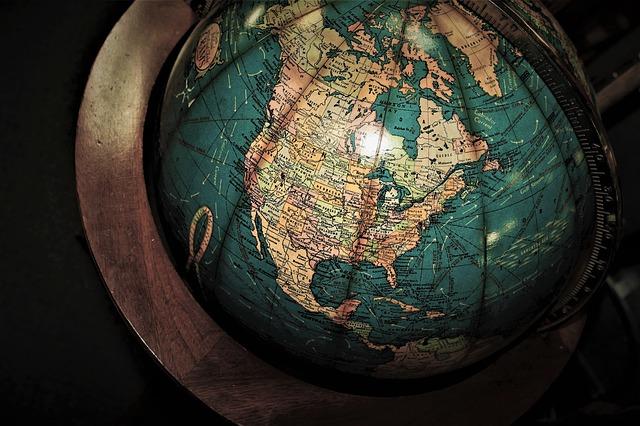"Geography is the subject which holds the key to our future." -Michael Palin
Geography is the study and revision of physical features of the Earth and its atmosphere; the three major branches of geography are Human Geography, Physical Geography, and Environmental Geography.
When studying an academic discipline that features much intricate terminology such as geography, it is crucial to depend upon a glossary.
What is a Geographical Term?
A geography term is a word or phrase used in the field of geography. These terms are often related to the physical characteristics of a location, such as topography, latitude, and climate.
Without further ado, Superprof has lovingly created a glossary of the most essential geographical terms for budding geographers

Geographical Terms from A-F
A
- Archipelago - A group or chain of islands.
- Arid - Extremely dry, usually referring to a climate.
- Atoll - A ring-shaped coral reef, island, or series of islets.
- Avalanche - A large mass of snow, ice, and rocks falling rapidly down a mountainside.
- Alluvium - Loose, unconsolidated soil or sediments that have been eroded, reshaped by water, and redeposited.
- Alpine - Refers to high mountain areas above the tree line.
- Anthropogenic - Environmental changes caused or influenced by humans.
- Aquifer - An underground layer of water-bearing rock or sediment capable of yielding water.
- Axis - An imaginary line around which a body rotates.
Earth's axis is an imaginary line that passes through the planet's center from pole to pole. It is tilted at an angle of 23.5 degrees relative to Earth's orbital plane, which is the plane of Earth's orbit around the Sun.
B
- Basin - A natural depression on the earth's surface, typically containing water.
- Bay - A broad inlet of the sea where the land curves inward.
- Beach - A pebbly or sandy shore, especially by the ocean.
- Biome - A large naturally occurring community of flora and fauna occupying a major habitat.
- Bog - Wet, spongy ground with soil composed mainly of decayed plant material.
- Butte - An isolated hill with steep sides and a flat top.
- Barrier Island - A long, narrow island lying parallel and close to the mainland, protecting the mainland from erosion and storms.
- Bayou - A marshy outlet of a lake or river.
- Badlands - A type of dry terrain where softer sedimentary rocks and clay-rich soils have been extensively eroded.
C
- Canyon - A deep gorge, typically one with a river flowing through it.
- Cape - A headland of large size extending into a body of water.
- Cartography - The science or practice of drawing maps.
- Climate - The weather conditions prevailing in an area over a long period.
- Crevasse - A deep open crack, especially one in a glacier.
- Current - A body of water or air moving in a definite direction, especially through a surrounding body of water or air in which there is less movement.
- Cumulus - A type of cloud characterized by dense, white, fluffy clumps.
- Cyclone - A system of winds rotating inward to an area of low atmospheric pressure, with a counterclockwise (northern hemisphere) or clockwise (southern hemisphere) circulation; a depression.
The deadliest tropical cyclone in recorded history, the 1970 Bhola Cyclone struck East Pakistan (present-day Bangladesh) and India's West Bengal on November 12, 1970. It claimed an estimated 500,000 lives, primarily due to a storm surge that devastated coastal areas
D
- Delta - A landform at the mouth of a river created by sediment deposits.
- Desert - A barren area of landscape where little precipitation occurs.
- Dune - A mound or ridge of sand or other loose sediment formed by the wind.
- Drainage Basin - The area of land where all precipitation collects and drains off into a common outlet, like a river.
- Depression - A sunken geological formation, such as a pit or basin.
- Drift - Material, such as sand, gravel, or silt, transported and deposited by wind, water, or ice.
- Divide - A ridge or an area of high ground that separates waters flowing to different rivers or basins.
- Downstream - The direction in which a river or stream flows from its source to its mouth.
- Dome - A rounded, uplifted geological structure formed by the upwelling of magma or the compression of rock layers.
- Dike - A long wall or embankment built to prevent flooding from the sea or a river.
E
- Earthquake - A sudden and violent shaking of the ground.
- Ecosystem - A biological community of interacting organisms and their physical environment.
- Elevation - The height of a geographic location above a fixed reference point, usually sea level.
- Estuary - The tidal mouth of a large river, where the tide meets the stream.
The Highest Point Above Sea Level Measured from sea level, Mount Everest, located in the Himalayas between Nepal and Tibet, is the highest mountain in the world, reaching a staggering 8,848.86 meters (29,031.7 feet)
F
- Fault - A fracture in the earth's crust resulting in displacement of the land.
- Fjord - A long, narrow, deep inlet of the sea between high cliffs.
- Floodplain - An area of low-lying ground adjacent to a river, formed mainly of river sediments and subject to flooding.
- Forest - A large area covered chiefly with trees and undergrowth.
Did you know that geography has five themes and that there are distinct types of geography?
Geographical Terms From G-M
The following definitions begin with the letters G, H, I, J, K, L, and M and aid geography students to remember essential terms.
G
- Glacier - A large, slow-moving mass of ice.
- Gorge - A deep, narrow valley with steep sides.
- Grassland - A large open area covered with grass, especially one used for grazing.
- Gulf - A deep inlet of the sea almost surrounded by land.
H
- Habitat - The natural home or environment of an organism.
- Harbor - A place on the coast where ships may find shelter.
- Hill - A naturally raised area of land, not as high or craggy as a mountain.
- Horizon - The line at which the earth's surface and the sky appear to meet.
I
- Iceberg - A large floating mass of ice detached from a glacier.
- Island - A piece of land surrounded by water.
- Isthmus - A narrow strip of land connecting two larger land areas.
J
- Jungle - An area of land overgrown with dense forest and tangled vegetation, typically in the tropics.
- Jurassic - A period of the Mesozoic Era, characterized by the dominance of dinosaurs and the first appearance of birds.
- Joint - A fracture or crack in rock along which there has been no significant movement.
- Jettison - The act of throwing goods overboard from a ship or aircraft to lighten the load in an emergency.
K
- Kay - A small, low-lying coral or sandy island on a coral reef.
- Karst - A landscape underlain by limestone that has been eroded, producing ridges, towers, fissures, sinkholes, and other characteristic landforms.
- Knoll - A small hill or mound.
- Kettle Lake - A shallow, sediment-filled body of water formed by retreating glaciers or draining floodwaters.
Australia's Nullarbor Plain is the world's largest limestone karst. Slovenia has the highest risk of sinkholes globally, while the western Highland Rim in the eastern United States is the second-highest risk area for karst sinkholes.
L
- Lagoon - A stretch of salt water separated from the sea by a low sandbank or coral reef.
- Latitude - The distance north or south of the earth's equator, measured in degrees.
- Levee - An embankment built to prevent the overflow of a river.
- Longitude - The distance east or west of the prime meridian, measured in degrees.
M
- Marsh - A wetland area that is dominated by herbaceous plants.
- Mesa - An isolated flat-topped hill with steep sides, found in landscapes with horizontal strata.
- Mountain - A large natural elevation of the earth's surface rising abruptly from the surrounding level.
- Moraine - An accumulation of glacial debris (as boulders, gravel, and sand) carried and deposited by a glacier.
Check out our articles about geography facts and famous geographers.

Geographical Terms from N-S
Want to know common geography expressions that start with the letters, N, O, P, Q, R, and S? The following provides the necessary information.
N
- Nadir - The point on the celestial sphere directly opposite the zenith and directly beneath the observer.
- Narrows - A narrow part of a strait, river, or other waterway.
- Natural Resource - Materials or substances such as minerals, forests, water, and fertile land that occur in nature and can be used for economic gain.
- Neap Tide - A tide just after the first or third quarters of the moon when there is the least difference between high and low water.
- Nubian Desert - A desert in northeastern Sudan, north of the Nile River.
O
- Oasis - A fertile spot in a desert where water is found.
- Ocean - A vast body of salt water that covers almost three-quarters of the earth's surface.
- Orographic - Relating to mountains, especially about their position and form.
- Outback - The remote and usually uninhabited inland regions of Australia.
- Overgrazing - Grazing so heavily that the vegetation is damaged and the ground becomes liable to erosion.
P
- Pampas - Extensive, treeless plains in South America.
- Peninsula - A piece of land almost surrounded by water or projecting out into a body of water.
- Permafrost - Ground, including rock or soil, that remains at or below 0°C for at least two consecutive years.
- Plateau - An area of relatively level high ground.
- Polynya - An area of open water surrounded by sea ice.
- Prairie - A large open area of grassland, especially in North America.
- Prevailing Wind - A wind from the direction that is predominant at a particular place or season.
- Pyramid - A monumental structure with a square or triangular base and sloping sides that meet in a point at the top, especially one built of stone as a royal tomb in ancient Egypt.
Q
- Quagmire - A soft, boggy area of land that gives way underfoot.
- Quarry - A place, typically a large, deep pit, from which stone or other materials are extracted.
- Quay - A platform lying alongside or projecting into water for loading and unloading ships.
R
- Rainforest - A dense forest rich in biodiversity, found typically in tropical areas with consistently heavy rainfall.
- Ravine - A deep, narrow gorge with steep sides.
- Reef - A ridge of jagged rock, coral, or sand just above or below the surface of the sea.
- Reservoir - A large natural or artificial lake used as a source of water supply.
- Ridge - A long, narrow hilltop, mountain range, or watershed.
- Riparian - Relating to or situated on the banks of a river.
- River Delta - A landform at the mouth of a river created by sediment deposits.
S
- Sahara - The largest hot desert in the world, located in North Africa.
- Savanna - A grassy plain in tropical and subtropical regions, with few trees.
- Sea - A large body of salt water that is smaller than an ocean and partially enclosed by land.
- Sea level - The average level of the world's oceans' surfaces. It serves as a baseline for measuring the elevation of land surfaces and depths of ocean floors.
- Seamount - A mountain rising from the ocean seafloor that does not reach the water's surface.
- Sediment - Matter that settles to the bottom of a liquid; dregs.
- Steppe - A large area of flat unforested grassland in southeastern Europe or Siberia.
- Strait - A narrow passage of water connecting two seas or two other large areas of water.
- Swamp - An area of low-lying, uncultivated ground where water collects; a bog or marsh.
Find a geography teacher for your kids on Superprof.
Geographical Term from T-Z
T
- Tectonic Plate: Large, rigid pieces of the Earth's lithosphere that move relative to one another.
- Tide: The rising and falling of sea levels caused by gravitational forces exerted by the Moon and the Sun.
- Topography: The physical features of an area, including its relief, elevation, and landforms.
- Tributary: A smaller river or stream that flows into a larger river.
- Tundra: A vast, treeless biome characterized by low temperatures, short growing seasons, and permafrost.
The Pacific Plate is the largest tectonic plate on Earth, covering an area of 103 million square kilometers (40 million square miles). It is an oceanic plate, meaning it is composed primarily of oceanic crust. The Pacific Plate is located beneath the Pacific Ocean and is surrounded by several other tectonic plates, including the North American Plate, the Eurasian Plate, and the Australian Plate
U
- Urbanization: The process of an increasing proportion of a population living in urban areas.
- Uplift: The vertical elevation of Earth's surface in response to tectonic forces.
- Urban Sprawl: The unplanned and uncontrolled expansion of urban areas into surrounding rural areas.
V
- Valley: A low area of land between hills or mountains, often containing a river or stream.
- Volcano: A vent in the Earth's crust through which lava, ash, and gases erupt.
The Earth's Biggest Volcano Mauna Loa in Hawaii, United States, is the largest volcano on Earth, reaching a staggering height of 9,170 meters (30,085 feet).
W
- Water Table: The level below the Earth's surface at which the ground is saturated with water.
- Watershed: The area of land where all of the water that is under it or drains off of it goes into the same place.
- Wetland: A land area that is saturated with water, either permanently or seasonally, such as swamps or marshes.
X, Y, Z
There aren't many geographic glossary terms that start with X, Y, or Z. However, here are some terms that may relate:
- Xeric: This term refers to environments or regions characterized by very dry conditions, often with limited rainfall. Xeric habitats can include deserts, semi-deserts, and other arid landscapes.
- Xerophyte: A plant adapted to survive in arid conditions.
- Yardang: A long, narrow ridge or hill of sand or silt shaped by the wind, typically found in arid regions. Yardangs often align with the prevailing wind direction and are common features in desert landscapes.
- Zephyr: A gentle, mild breeze typically occurring in the Mediterranean.
There you have it geography enthusiasts, 60 plus of the most common geography words and definitions that should be referred to when studying geographic information; we all forget sometimes and well-organised glossaries aid our memory to recall essential facts and explanations.
Nevertheless, even with a failing memory, it is important to recall that geography rules!
Learn all this and more in greater depth with geography courses online with Superprof!
Summarise with AI:
















good work done
NICELY WRITTEN